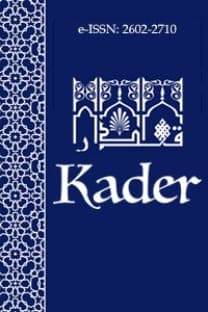Pülümür Alevilerinin Temel Dini İnançları
The construction of healthy communication between Alawites and Sunnites is important. And it seems the relations between these two are getting better in recent times. In this essay which is called we try to shed light on basic religious beliefs of Alawites of Pulumur. These religious belief and rules are traditionally reviewed as six basic principles. Our aim in this study to help to understand the Alawism that is not uniform and to provide to set healthy communication among society layers. In this essay we arrived at the conclusion that Alawites are similiar to Sunnî Schools except that their belief of partially incomplete of Qur?an and reencarnation belief, the detail of which is to be examined in the paper.
Anahtar Kelimeler:
-
-
he construction of healthy communication between Alawites and Sunnites is important. And it seems the relations between these two are getting better in recent times. In this essay which is called we try to shed light on basic religious beliefs of Alawites of Pulumur. These religious belief and rules are traditionally reviewed as six basic principles. Our aim in this study to help to understand the Alawism that is not uniform and to provide to set healthy communication among society layers. In this essay we arrived at the conclusion that Alawites are similiar to Sunnî Schools except that their belief of partially incomplete of Qur’an and reencarnation belief, the detail of which is to be examined in the paper
Keywords:
Alewi, Religious Belief, Pülümür Islamic Theology,
___
- http://tuikrapor.tuik.gov.tr http://www.pulumur.gov.tr İlhan, Avni, “Şîa’da Usulü’d-Din”, Milletlerarası Tarihte ve Günümüzde Şiilik S empozyumu, İstanbul 1993.
- Kaleli, Lütfi, Binbir Çiçek Mozaiği Alevîlik, İstanbul 1996.
- Kutlu, Tezcan Özkan-Bekiroğlu, Onur, Türkiye Yazılı Basınında Anadolu Aleviliğin Temsili, New World S ciences Academy, 6/4, 2011.
- Noyan, Bedri, Bektaşîlik Alevîlik Nedir?, Ankara 1985.
- Öz, Mustafa, “Gâliyye”, Cilt XII, 333-337, DİA. Öztürk, Mustafa, “Alevîlerin Kur’ân Tasavvuru Üzerine”, İslamiyat, (2003), sy.3, VI.
- Subaşı, Necdet, “Sırrı Fâş Eylemek: Alevî(lik) Araştırmalarında Yöntem Sorunları”, İslâmiyât, (2003), sy. 3, VI.
- Subaşı, Necdet,“Alevîlik, Alevîler ve Modernleşme”, Birikim (2002), sy. 159.
- Topaloğlu, Bekir ve Diğerleri, İslâmda İnanç Esasları, İstanbul 2002.
- Tuncel, Metin, “Tunceli”, DİA, XXXXI, 378-380 (2012).
- Turan, Ahmet, Metin Bozkuş, “Günümüzde Sivas ve Çevresinde Yaşayan Alevîlerde İnanç Esasları”, OMÜİFD, sy. 24–25, (2007).
- Üçer, Cenksu “Hak-Muhammed-Ali (Üçler) Telakkileri Çerçevesinde Alevîlikte Hz. Ali”, Hz. Ali S empozyum Bildirileri, İzmir 2009.
- Üzüm, İlyas, Tarihsel ve Kültürel Boyutlarıyla Alevîlik, İstanbul 1997.
- Yavuz, Yusuf Şevki, “İmamiyye’nin Usûlü’d-Din’e İlişkin Görüşlerinin Değerlendirilmesi”, Milletlerarası Tarihte ve Günümüzde Şiilik Sempozyumu, İstanbul 1993.
- Yeşilyurt, Temel “Alevî-Bektaşiliğin İnanç Boyutu”, İslamiyat, sy.3 (2003), VI.
- Yıldırım, Erdal, Tunceli Yöresi Alevilerinde Geçiş Dönemi İnanç ve Uygulamaları Üzerine Sosyolojik Bir Araştırma. Ekev Akademi Dergisi, 14/42, 2010, 18.
- Yıldız, Harun, “Türkiye Alevîliğinin İnanç ve Ahlaki Değerleri”, Alevîliğin Dünü Bugünü (Ed. Halil İbrahim Bulut), Sakarya 2010.
- Zelyut, Rıza, Öz Kaynaklara göre Alevîlik, İstanbul 1998.
- Başlangıç: 2003
- Yayıncı: Mehmet BULĞEN
Sayıdaki Diğer Makaleler
Kozmolojik Kanıt ve İki İtiraz
Kadı Abdulcebbar'ın İyilik-Kötülük Düalitesine Yönelttiği Eleştiriler
Pülümür Alevilerinin Temel Dini İnançları
The Basic Tendencies of World Philosophy
Medrese Geleneğinde Akâid ve Kelâm İlmi
Kur'an'daki Nebî-Resul Kavramlarını Teolojik Yaklaşım
Tanrı'nın Cüz'ilere Dair Bilgisi Tartışmasında Gazzali'ye Felsefe Cephesinden Bir Destek
Maturidi'nin Mutezile Eleştirisi: Tanrı En İyiyi Yaratmak Zorunda mıdır?
